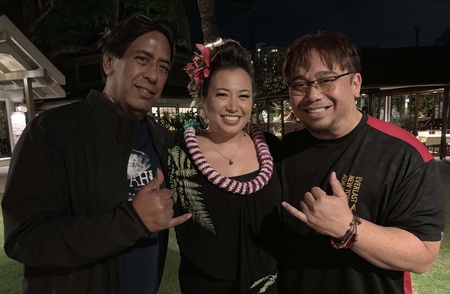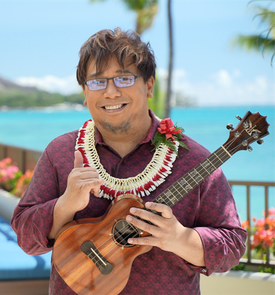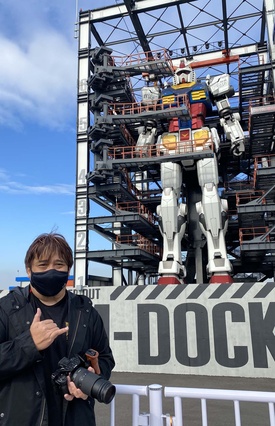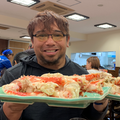LK: Who did you turn to when you needed advice?
PK: I’ve been very fortunate to have a number of people who have inspired and helped me quite a bit over the years. First of all, there would be no Doko Ga TV without the genius of Joanne Ninomiya. Joanne is a pioneer who connected people in Hawai‘i to Japan via the Japanese TV programs that she aired on the original KIKU. These shows fueled my love and passion for all things Japan.
Jun Maeda, former general manager of Kintetsu International Hawaii, taught me a lot about doing business in Japan and the importance of nomikai (after-hours drinking with co-workers, potential clients, etc.). Jun was a very old-school samurai; he was bold, brash and stubborn at times, but if he liked or respected you, there’s nothing he wouldn’t do to help and support you.
After retiring from Kintetsu, Jun moved back to Japan due to illness. Since my last trip to Japan in January 2021, I kept waiting for Japan to reopen so I could visit him, but he passed in July 2021. I will always cherish our memories, and miss him and his very kolohe (mischievous) smile.
David John “DJ” Pratt was a mentor in my foray into music. One of the founders and guitarist of Kalapana, DJ was a multiple award-winning performer and engineer. He was intimidating, not only because of his trademark look (dark glasses and black jacket), but also for being a shredder on guitar and a sonic genius in the studio.

Trying to record guitar solos with him looking on was beyond nerve-racking. He’d give advice, offer alternative ideas and if you nailed the take, he’d nod and just say, “cool.” He was so generous with his knowledge and his time.
I’m so grateful that I had a chance to talk to him the night before he passed on September 7, 2021. From initially being terrified of his presence to becoming very close friends, I will try to be as giving as DJ. Reading DJ’s eulogy at his funeral was one of the hardest yet most fulfilling things I’ve had to do. I missed him so much, but was happy that I could remind all in attendance how great DJ was and what he meant to me.
As a HUGE fan of Kikaidā and Kikaidā 01, I always thought Ichirō (Kikaidā 01’s human form) was so cool because he would play his trumpet, jump off a cliff, and beat up all the bad guys and monsters. In fact, I thought he’d be the coolest dad in the world, so tough yet kind.
Because Joanne Ninomiya kept the Kikaidā series alive over the years, she’d bring both Daisuke Ban (Jirō/Kikaidā) and Shunsuke Ikeda (Ichirō/Kikaidā 01) to Hawai‘i to meet the legions of fans. I would’ve never imagined meeting Ikeda-san, but I was able to meet him and his wife during one of these events and had given them one of my CDs. They were avid Hawaiian music fans, so he and his family would always attend my concerts in Japan, and we became very close. Ikeda-san always supported and encouraged me with what I was trying to do in music and Doko Ga TV.
Sadly, he passed in June 2010. He had asked his wife and daughter not to tell me he was ill as he didn’t want me to worry. I’ll never forget his kindness and sincerity. He started out as a childhood hero and became an actual father figure.
LK: What was one of the life-changing events that you experienced in Japan?
PK: The 2011 Tōhoku earthquake and tsunami. We wanted to do whatever possible to help, so we hoped that filming the challenges people there were going through would be of assistance with soliciting donations and continued relief efforts. With thanks to my friend Kazuyuki Sekiguchi, bassist of Southern All Stars (aka SAS, one of the biggest rock bands in Japan), and Amuse Entertainment (management company for SAS), they helped facilitate our Tōhoku visit, working with the mayors and various city halls. Sekiguchi-san and I worked on fundraising and purchased bikes, food, water and other goods. My band and I also performed at other fundraising shows in Tōkyō.
Driving through the devastation in each city was gut-wrenching. There were barely any houses still standing and according to our guide, over 18,000 lives were lost in Sendai alone. I’d walked past children’s bikes and toys, all the while hoping and praying they were able to escape. At the Shichigahama shelter, we saw people using cardboard boxes for beds, hanging what little clothes they had grabbed as their homes were being destroyed.
We continued through other areas of Tōhoku and came across what used to be a train station. The only thing left was part of a staircase. As we filmed more footage, I stumbled across a KIKI Radio cooler bag. I remembered having one in the ’80s and wondered if the owner had been in Hawai‘i when these were available.
After dropping off supplies at another shelter, my band and Sekiguchi-san performed for the people there. They were so thankful and in tears, as we were. An obāchan (grandmother) came up to us and explained that she lost her husband, children and grandchildren when the tsunami hit. She wondered why she survived and told us how much she appreciated us being there.
As the day progressed and after hearing stories from some of the survivors and volunteers working at each shelter, I couldn’t fathom what the next step would be for everyone there. I participated in several outreach projects across Tōhoku for a few more years afterward. Each time I was amazed and inspired by how much the people in those cities were able to rebuild. It’s a true testament of the resilience of the people of Japan.
LK: What is the most fulfilling aspect of your career?

PK: I think the fact that what started as a hobby turned into a career, one that’s allowed me to share my passion and love for Japan. I asked the Hawaii News Now folks for some numbers to get an idea of how many people tune in. For the 2021 season, Doko Ga TV episodes ran a total of 194 times (KFVE, KHNL, and KGMB), and the number of views we’d gotten was over 12 million for the year. I’m very humbled and a bit nervous because I’m hoping that everyone will continue to watch in 2022 and beyond, and I am incredibly thankful.
LK: How about a fun fact about yourself?
PK: I rarely sing or go to karaoke places here when friends invite me. For whatever reason, this is the complete opposite in Japan. After a long day of filming or even while on tours, I love going to karaoke. It’s funny; no matter how majime (serious) or hazukashii (shy) some of our crew or tour counterparts are in Japan, once a few beers have been downed, they turn into howling coyotes. I love that! So I join in.
I enjoy singing late Shōwa era (late ’80s) Japanese songs from artists like Southern All Stars and Tatsurō Yamashita. I’m in no way fluent in Japanese and am kanji reading impaired, but I can read hiragana and the more I sing Japanese karaoke, it actually helps with my reading ability! Win-win! I also love singing ’80s songs that were popular back in high school and lots of rock stuff that I’d never dare perform live.
LK: Can you tell us about some of your upcoming plans and special projects?

PK: The Doko Ga TV: EuropeMania series started airing on July 24, documenting my April 2022 travels in Spain and Portugal. I have four tours to Japan slated from September with Non-Stop Travel and Hawaiian Airlines. In between tours, I plan to film more Doko Ga TV and Love Hokkaidō episodes.
In addition, I’ll be working on the third annual 2023 Hokkaidō Hawai‘i High School Girls Softball Goodwill Games. I created this event in 2018 so that my niece and her friends could participate in a goodwill sports competition in Japan. It was previously held in 2019, so we’re looking forward to next year’s event.
I really would like to create and foster more cross-cultural exchanges and events like this. One of my stealth projects from 2021 was executive music and video producer for Hawai‘i boy band Crossing Rain. We’re working on their second album release and they will start touring in 2023.
* * * * *
Be Someone’s Reason to Smile
As I reflected on Pali’s childhood story, I wondered if perhaps destiny had played a role in it. Curious, I asked him at the end of our phone call if he believes in destiny. Without hesitation, he said, “Yes, absolutely!” For a guy as accomplished as he is, he remains very humble.
In any case, Pali’s achievements certainly would not have happened without his talents, work ethic, and perseverance. With the hope of making a positive difference, Pali invests his artistry and creativity into all of his projects. His unwavering dedication assures audiences and fans alike that he will continue to entertain us in the years to come.
All photos are courtesy of Pali Ka‘aihue.
*This article was originally published in The Hawai‘i Herald on August 5, 2022.
© 2024 Lois Kajiwara





